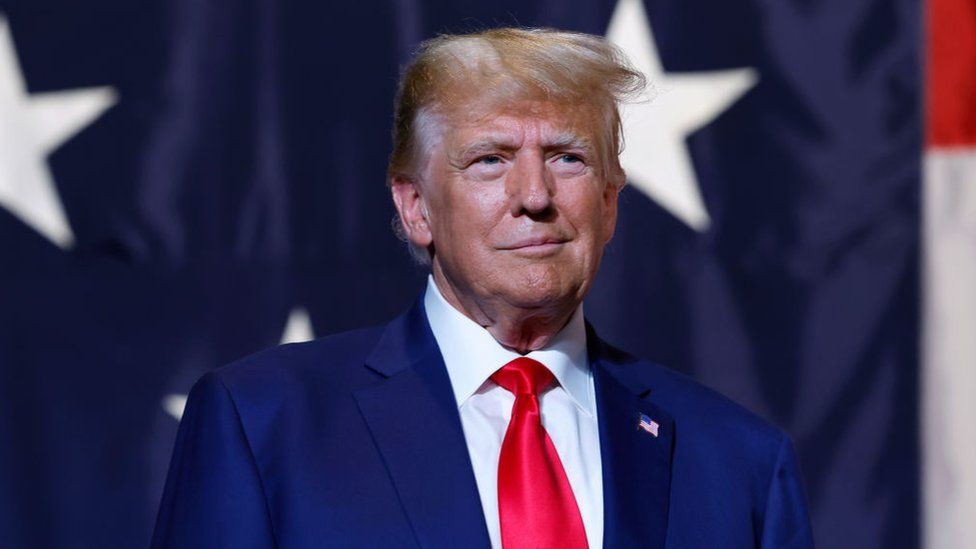
What is racketeering? Trump charged with mafia-busting law in Georgia

Donald Trump is expected to face his fourth criminal indictment next week, in the state of Georgia
The first count in the Georgia indictment charges Donald Trump and 18 others with racketeering for their alleged efforts to overturn the results of the 2020 presidential election in the state.
Announcing the charges, Fulton County District Attorney Fani Willis implicated the former president in a sprawling election subversion conspiracy, with him as the ringleader.
“The indictment alleges that rather than abide by Georgia’s legal process for election challenges, the defendants engaged in a criminal, racketeering enterprise to overturn Georgia’s presidential election results,” she said.
These are the fourth set of criminal charges brought against Mr Trump in recent months, but it is the first time a former American president faces charges once used to convict mob bosses like John Gotti and Vincent Gigante.
Organised criminal activity in the US is routinely prosecuted under the federal Racketeer Influenced and Corrupt Organizations (Rico) Act.
Rico laws help prosecutors connect the dots between underlings who broke laws and those who gave them marching orders.
More than 30 US states have implemented their own versions of the federal government’s Rico Act and Georgia’s adaptation is broader in scope than most.
Federal Rico statutes list 35 crimes that would qualify as evidence of racketeering, but Georgia’s Rico laws choose from a list of 65.
Prosecutors are required to show that a criminal “enterprise” exists and to detail a pattern of racketeering that rests on at least two qualifying crimes.
Image source, Getty Images
Rudy Giuliani (center) may face charges in any Rico indictment
Penalties under Georgia’s Rico Act are steep – prison terms between five and 20 years, or fines of up to $250,000 (£197,000) – and can help persuade subordinates to cut deals with the prosecution in exchange for lesser sentences.
Such incidents may generate a wave of never-before-seen evidence and testimony prosecutors can use against the alleged ringleaders, according to Anthony Michael Kreis, a law professor at Georgia State University.
To convict Mr Trump himself, Mr Kreis said prosecutors will have to show the former president was “not some kind of passive participant” following legal advice, but the man “driving the bus”.
Mr Trump is already facing federal charges from the US Department of Justice over his false election claims, in a trial whose evidence could factor into, and overlap with, the case in Georgia.
He is also awaiting trial over his alleged mishandling of classified documents and his hush-money payments to a porn star.
District Attorney Fani Willis, a Democrat, has used the state’s racketeering laws for high-profile prosecutions in the past.
In 2013, she led the prosecution – on Rico charges – of Atlanta public school teachers and administrators accused of cheating on state-run standardised tests in order to secure bonuses and promotions.
“You don’t, under Rico, have to have a formal, sit-down dinner meeting where you eat spaghetti,” Ms Willis explained as she indicted nearly three dozen educators about a decade ago.
“But what you do have to do is all be doing the same thing for the same purpose. You all have to be working towards that same goal.”
Eleven of 12 officials were ultimately convicted at trial, the longest in state history, with most other co-conspirators taking guilty pleas.
Image source, Getty Images
Rico is a tool that helps prosecutors tell the whole story, says Fani Willis
Last year, Ms Willis leaned on Rico statutes again to allege that Grammy-winning rapper Young Thug and 27 associates at his YSL music label are a “criminal street gang”.
“The reason that I am a fan of Rico is, I think jurors are very, very intelligent,” she said at a news conference to announce the charges.
“They want to know what happened. They want to make an accurate decision about someone’s life. And so Rico is a tool that allows a prosecutor’s office and law enforcement to tell the whole story.”
But a trial that was set to begin this past January is now eight months into a glacial jury selection process, with thousands of jurors excused and not a single juror seated.
That has left Young Thug sitting in jail for 15 months, while a handful of his YSL co-defendants have taken plea deals or had their cases separated from the trial.
“I am hoping Fani Willis has learned from this YSL case when Donald Trump’s case finally gets to that level,” said Keisha Steed, an Atlanta defence attorney. “The way it’s playing out has been a mess!”
She said Ms Willis’s office did not seem “prepared for the number of jurors that they had to call in, the logistics of having everybody be in one place, the time it takes for all attorneys to question jurors”.
The plodding pace of Young Thug’s trial has set it on course to beat the record set by the Atlanta educators’ trial as the longest in state history.
That is not unusual for multi-defendant and multi-attorney Rico cases, which can create major backlogs in the legal system.
“The whole courthouse is basically closed,” said Meg Strickler, another local defence attorney.
“I hate the Rico Act,” she added, saying clients are frequently intimidated by the penalties they could face, and the time and money needed to defend themselves.
And, given how lengthy and complicated Rico trials are, she expects the Trump trial will prove a confusing and uncomfortable affair for a jury, if one can eventually be seated.
“Jurors are going to fall asleep long before they understand it,” Ms Strickler predicted.
Source: https://www.bbc.co.uk/news/world-us-canada-66465240?at_medium=RSS&at_campaign=KARANGA















